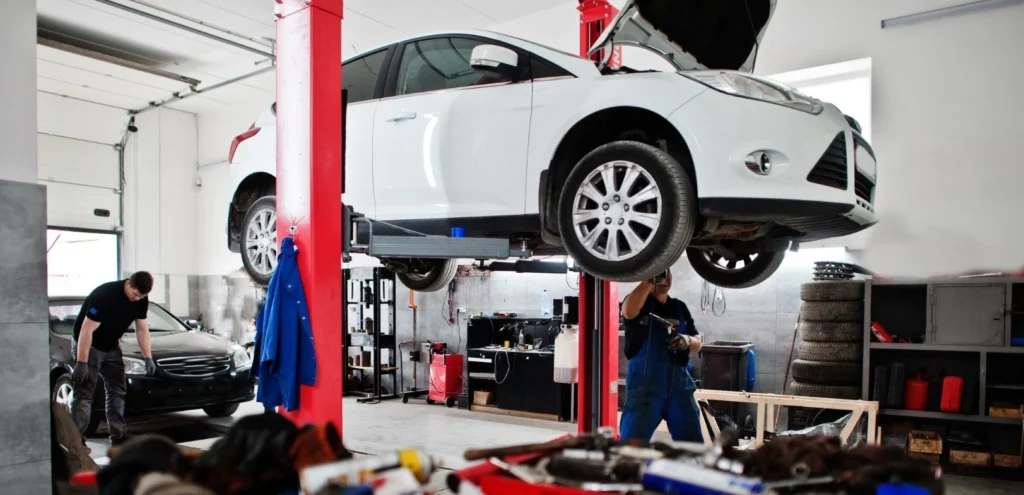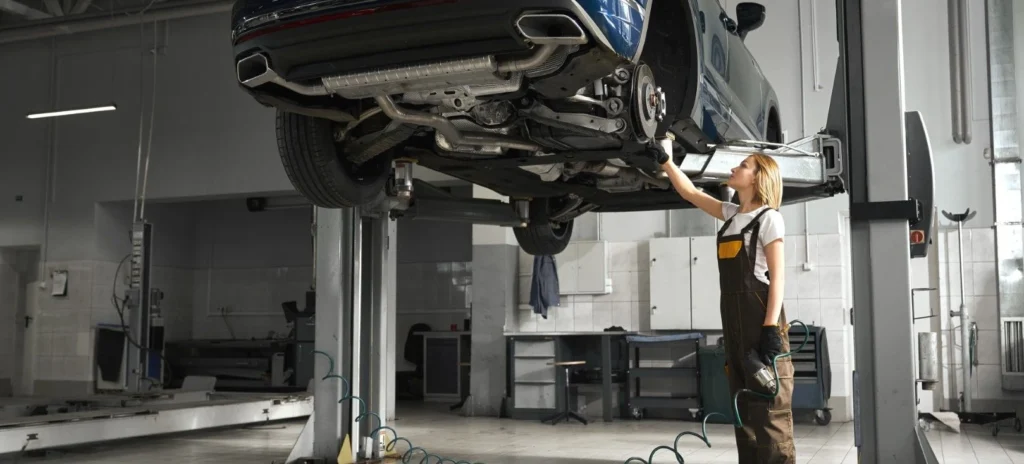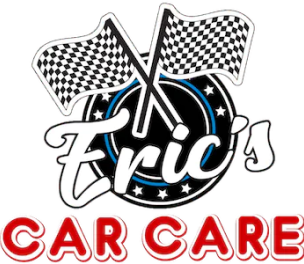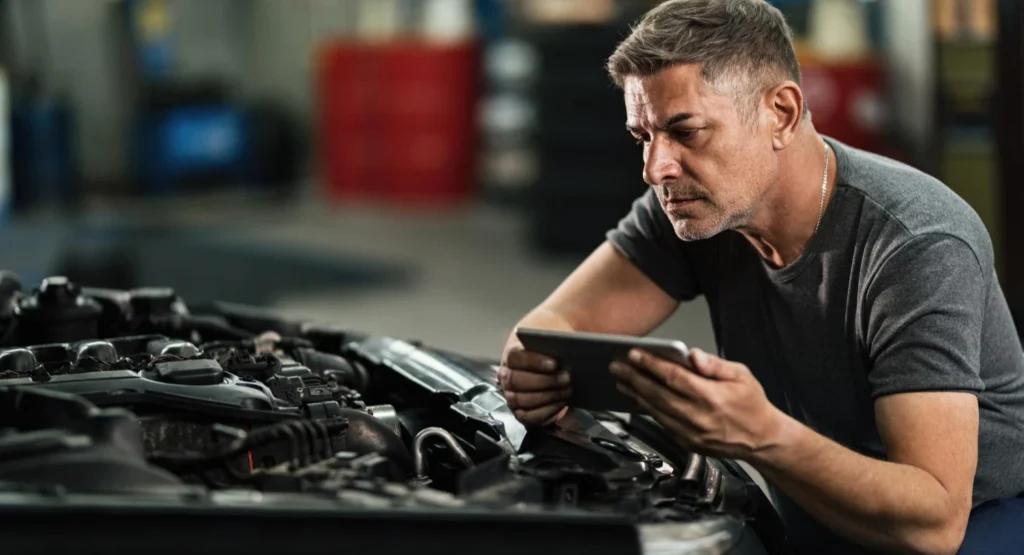Regular car maintenance is crucial for long-term performance and retaining resale value. It is also important for the safety of both drivers and passengers. Regular maintenance ensures the smooth running of the car and saves money on long-term repairs. Let’s dive into the world of auto repair Houston and discover how to keep your car in top-notch condition. This blog provides easy-to-follow advice on following this checklist, making it a convenient and cost-effective way to maintain your vehicle.
If you’re searching for ‘auto repair near me,’ we’re here to help — book your service today.
Importance Of Car Maintenance
Regular vehicle maintenance is essential for safety, dependability, fuel efficiency, and vehicle value. It’s recommended to consult the owner’s manual and follow the preventive maintenance schedule. Regular maintenance prevents breakdowns and accidents, extends vehicle lifespan, and reduces running costs. Well-maintained cars are also more fuel-efficient, reducing overall costs. Routine checks and servicing help identify minor issues before they become major repairs, making car maintenance a wise investment for every vehicle owner.
The Ultimate Car Maintenance Checklist
Taking care of your car ensures it runs smoothly and helps you save money on repairs in the long run—Let’s get started with some easy-to-follow advice.
Check Your Oil and Fluids
Regular oil checks are crucial for maintaining optimal car performance. It’s easy and doesn’t require a mechanic’s expertise. Check the oil dipstick, wipe it clean and reinsert it. If low, top up with the recommended oil type.
Monitor transmission fluid, brake fluid, and coolant levels to prevent costly issues. Synthetic oil lasts longer and is cleaner but may take longer to change.
Your owner’s manual should guide engine viscosity and average mileage per oil change. Check oil levels using a dipstick or electronic gauge. Good oil is translucent and smoother.
Inspect Your Tires
Tires are essential for your car’s connection to the road and should be regularly inspected for signs of wear and tear. Regular tire rotation can extend their lifespan and improve fuel efficiency. If unevenly balding or visible damage occurs, replace them. Check the treads and tire pressure gauge for low-tech information.

Regular tire checks, including wheel alignment, are crucial for maintaining vehicle performance and efficiency. Neglecting tire maintenance compromises safety and increases fuel consumption. Regular tire rotation and wheel alignment are essential for a smooth and safe journey on long routes.
So, remember to schedule routine inspections to keep your tires and wheel alignment in top shape.
Brake Inspection
Brake inspection is crucial for safety in a car. Listen for squeaking or grinding sounds when applying brakes, as worn pads may indicate a decrease in braking performance. If these sounds or performance decreases, have brakes inspected and replaced if necessary. Check brake fluid levels, as low fluid can lead to brake failure, a safety hazard. Brakes are essential for driving and emergencies, so checking them during car maintenance is crucial.
Battery Maintenance
To prevent stranding, regularly inspect your battery for corrosion and secure connections: auto shops and service centers offer free battery checks. If your battery is older than five years, replace it. Regularly check battery and generator performance to ensure proper charging and starting. A good battery and generator are essential for proper car operation and charging.
Air Filter Replacement
Air filter replacement is crucial for maintaining a car’s engine efficiency. It prevents dust and debris from entering the engine, which can become clogged over time. Replacing the air filter is simple, requiring the old filter housing to be removed and a new one installed. The filter regulates airflow, filtering out pollutants and debris, which increases engine life. Regular maintenance ensures the filter’s service.
Lights and Signals
Regularly check all lights and signals on your car, including headlights, taillights, turn signals, and brake lights—Replace burnt-out bulbs for safety and others on the road. Cars have various types of lights, including headlights, backlights, and indicators, which all play a vital role in the lighting system. It’s mandatory to check and clean these lights during car maintenance.
Air Filters
Air and cabin filters are crucial for maintaining a car’s engine performance and air quality. The engine air filter prevents dirt, debris, and contaminants from entering the engine, while the cabin filter blocks pollutants from entering the car’s HVAC system. To maintain good air quality, it is essential to replace the cabin filter. The air filter can vary depending on the make and model of the car.
Clogged filters can affect performance and fuel efficiency, and automakers may recommend maintenance timeframes based on mileage. To determine the condition of the filters, use your eyes and nose to detect clogged or dirty ones.
An odd or musty odor in the cabin may indicate the filter condition, especially when heat or AC is on. When inspecting an engine air filter, raise it towards a light source and replace it if no light passes.
Wipers Blades
Windshield wipers, especially in Canadian weather, can cause significant issues. If water streaks appear after every swipe, it may be time to replace them. To improve performance, wipe down the rubber with a washcloth. Wipers have standardized lengths and sizes but may have different lengths on the left and right sides.
Regularly checking and cleaning wipers can prevent accidents due to poor road view, nearby vehicles, or passengers. When maintaining your vehicle, repair the motor and replace damaged or inefficient blades.
Seat Belts
Timing and serpentine belts are common vehicle belts that require periodic replacement due to varying manufacturer recommendations. These belts are difficult to replace outside a garage and should be left to a professional mechanic.
Checking signs like cracking, fraying, and loosening tension can help determine when to replace them. Seat belts also require periodic replacement, but there’s no universal number for intervals. Regular cracking, fraying, or excessive slack inspections can help determine the appropriate time.
Spark Plugs
Spark plugs are essential for a car’s engine to strike the gas and air mixture, and their malfunction can cause the engine to lose power—regular check-ups and maintenance are crucial for proper functioning. Copper spark plugs have a longer center electrode than iridium ones, which are more expensive but offer a better spark. If the electrode and tip are black from the engine crud, they must be cleaned or replaced.
Spark plugs are crucial to engine efficiency and can get clogged, affecting overall performance. Your handbook tells you how often you should change your spark plugs. However, your spark plug may need to be replaced sooner if:
- Your car struggles to accelerate.
- You can’t start the engine or hear strange “popping” sounds.
- You realize that your fuel efficiency is deteriorating.

This car maintenance and service checklist is simple and cost-effective, ensuring good condition, saving money on repairs, and enhancing safety on the road. Regular maintenance extends the car’s life and enhances the driving experience. Use basic tools and give your car the care it deserves to maintain its performance.
Trust the Experts at Eric’s Car Care
Eric’s Car Care is a trusted automotive service provider offering comprehensive maintenance and service checklists to ensure your vehicle runs smoothly and safely. Our team of experts handles all automotive needs, from oil changes to brake inspections. We prioritize quality and attention to detail, ensuring your car is in top-notch condition. If you’re ready to trust Eric’s Car Care to keep your vehicle in top-notch condition, Contact Us today to schedule your comprehensive car maintenance and service. Trust Eric’s Car Care for worry-free driving and peace of mind.
call us today at 713-667-9293 to schedule your comprehensive car maintenance and service. Trust Eric’s Car Care for worry-free driving and peace of mind.

